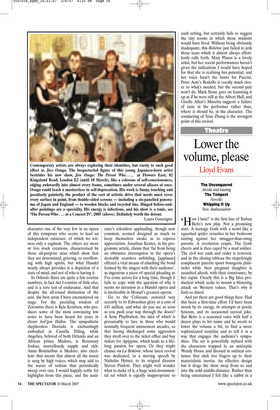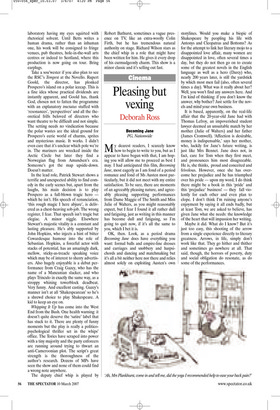Lower the volume, please
Lloyd Evans
The Unconquered Arcola and touring The Tempest Novello Whipping It Up New Ambassadors ‘How I hate!’ is the first line of Torben Betts’s new play. Not a promising start. A teenage Goth with a scowl like a squashed spider crouches in her bedroom ranting against her smugger-than-smug parents. A revolution erupts. The Goth cheers and is then raped by a mad soldier. The civil war ends and order is restored, and in the closing tableau the stupefyingly complacent parents spout bourgeois platitudes while their pregnant daughter is assaulted afresh, with their connivance, by her rapist. Clearly this is a Big Idea production which seeks to mount a blistering attack on Western values. That’s why it feels so dated.
And yet there are good things here. Had this been a first-time effort I’d have been struck by its energy, its attempts at poetic lyricism, and its occasional surreal joke. But Betts is a seasoned voice with half a dozen plays to his name and he needs to lower the volume a bit, to find a more sophisticated storyline and to tell it in a way that engages the audience’s sympathies. The set is powerfully stylised with the characters trapped in an antiseptic Wendy House and dressed in satirical costumes that stick two fingers up to their materialistic inertia. An effective design but it drags the show away from us and into the cold middle-distance. Rather than being entertained I felt like a rabbit in a laboratory having my eyes squirted with rhetorical solvent. Until Betts writes a human drama, rather than an inhuman one, his work will be consigned to fringe venues, pub theatres, hole-in-the-wall arts centres or indeed to Scotland, where this production is now going on tour. Bring earplugs.
Take a sou’wester if you also plan to see the RSC’s Tempest at the Novello. Rupert Goold, the director, has plonked Prospero’s island on a polar icecap. This is a fine idea whose practical dividends are instantly apparent, and Goold has, thank God, chosen not to fatten the programme with an explanatory tractatus stuffed with ‘resonances’, ‘perspectives’ and all the theoretical frills beloved of directors who want theatre to be difficult and not simple. The setting needs no vindication because the polar wastes are the ideal ground for Prospero’s eerie world of charms, sprites and mysterious music. It works. I didn’t even care that it’s unclear which pole we’re in. The mariners are wrecked inside the Arctic Circle but later they find a Norwegian flag from Amundsen’s era. Someone’s got the map upside-down. Doesn’t matter.
In the lead role, Patrick Stewart shows a terrific and unexpected ability to find comedy in the early scenes but, apart from the laughs, his main decision is to play Prospero as a full-blown tragic hero which he isn’t. His speech of renunciation, ‘this rough magic I here abjure’, is delivered as a chest-heaving sob-job. The wrong register, I fear. That speech isn’t tragic but elegiac. A minor niggle. Elsewhere Stewart’s majestic vitality is a constant and lasting pleasure. He’s ably supported by John Hopkins, who injects a hint of bitter Cowardesque humour into the role of Sebastian. Hopkins, a forceful actor with stacks of potential, has an amazingly dark, mellow, sticky-as-treacle speaking voice which may be of interest to sherry advertisers. Also hugely enjoyable is a debut performance from Craig Gazey, who has the name of a Mancunian slacker, and who plays Trinculo in exactly the same way, as a stroppy whining towerblock deadbeat. Very funny. And excellent casting. Gazey’s manner isn’t at all ‘Shakespearean’ so he’s a shrewd choice to play Shakespeare. A kid to keep an eye on.
Whipping It Up has come into the West End from the Bush. One health warning: it doesn’t quite deserve the ‘satire’ label that has stuck to it. There are plenty of funny moments but the play is really a politicopsychological thriller set in the whips’ office. The Tories have scraped into power with a tiny majority and the party enforcers are running around trying to thwart an anti-Cameroonian plot. The script’s great strength is the thoroughness of the author’s research. Dozens of MPs have seen the show and none of them could find a wrong note anywhere.
The deputy chief whip is played by Robert Bathurst, sometimes a vague presence on TV, like an extra-woolly Colin Firth, but he has tremendous natural authority on stage. Richard Wilson stars as the chief whip in a role that might have been written for him. He gives it every drop of his curmudgeonly charm. This show is a minor classic and it’s selling out fast.



























































































 Previous page
Previous page